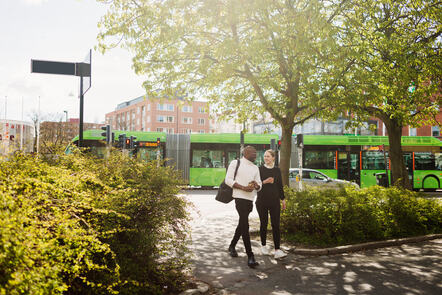
RMIT University
- Start Date: 19 Sep, 2022
- 3 weeks
- Study Content: Videos
Delve into cleaner modes of transport to discover how transport policy affects air quality, citizen health, and liveability.
Course Fee: Free
Certificate Cost: See Fees and Eligibility
Course Description
This course is made available through the eLearnAfrica and FutureLearn partnership.
Learn how transport planning can contribute to population health
How we plan the transport in our cities can affect preventable health risks, including our exposure to air pollution.
Reducing congestion, one of the major contributors to poor air quality, and designing efficient transport systems to support growing populations remains a pressing issue for many city leaders.
On this three-week course, you’ll discover how a focus on cleaner transport can improve population health and urban liveability. By the end, you’ll understand the best practices for implementing transport policy for healthier changes.
Delve into low-car urbanism
You’ll explore the different approaches that can help reduce car use in urban areas as you uncover what makes an effective city for cycling, walking, and using public transport.
From influencing user behaviour to exploring mobility environments, you’ll discover how cities can be transformed into a place of low-car urbanism.
Understand the benefits of electric vehicles and shared mobility
You’ll delve into the use of cleaner modes of transport such as electric vehicles, shared mobility, and freight.
You’ll also be exposed to new design tools such as health impact assessments. With these tools, you can show how population health can be improved with transport, with the change in air pollution exposure measured and assessed for impact.
Learn the fundamentals of transport policy from the experts at RMIT University
Finally, you explore the best practices for implementing transport policy to understand how positive change can happen.
With the guidance of the specialists at RMIT University and through the exploration of case studies, you’ll finish the course with the knowledge of how transport policy can help improve air quality and in turn, the health of the population.
This course is designed for those working in urban mobility and sustainable urban development, or those interested in working in these fields.
Certificate cost may vary. You will be redirected to the host page for cost and payment options.
RMIT University
RMIT is a global university of technology, design and enterprise specialising in art and design; architecture and the built environment; engineering; computer science; and business and management studies.
One of Australia’s original tertiary institutions, RMIT University has over 80,000 students (including 12,000 at postgraduate level) who are undertaking professional and vocational education, applied research, and industry and community engagement.
RMIT has a unique approach to meeting the challenge of being ready for life and work: it offers an education that is deeply grounded in ideas and cross-disciplinary understanding, applied through innovative, enterprising practice to solving problems and meeting the needs of its community.
RMIT’s goal is to offer life-changing experiences, and to shape the world with the talent, knowledge and learning capability that it shares.
This institution is available on eLearnAfrica through partnership with FutureLearn.
COLLABORATION POLICY
By enrolling in a course on or through eLearnAfrica, you are joining a special worldwide community of learners. The aspiration of eLearnAfrica is to provide anyone with an internet connection access to courses from the best universities and institutions in the world and to provide our learners the best educational experience internet technology enables. You are a part of the community that will help eLearnAfrica achieve this goal. eLearnAfrica depends upon your motivation to learn the material and to do so with honesty and academic integrity. In order to participate in eLearnAfrica, you must agree to the Honor Code below and any additional terms specific to a class.
ELEARNAFRICA HONOR CODE PLEDGE
By enrolling in a course, program, or degree hosted on the eLearnAfrica App or Site, I agree that I will:
-
Complete all tests and assignments on my own, unless collaboration on an assignment is explicitly permitted.
-
Maintain only one user account and not let anyone else use my username and/or password.
-
Not engage in any activity that would dishonestly improve my results, or improve or hurt the results of others.
-
Not post answers to problems that are being used to assess student performance.
-
Abide by any and all requirements of the eLearnAfrica Participants as may regard the expectations of civil or academic behavior or of community standards.
VIOLATIONS
If you are found in violation of the Terms and Conditions or Honor Code, you may be subject to one or more of the following actions:
-
Receiving a zero or no credit for an assignment;
-
Having any certificate earned in the course withheld or revoked;
-
Being unenrolled from a course, learning program or degree program; or
-
Termination of your use of the App and/or Site.
-
Additional actions may be taken at the sole discretion of eLearnAfrica and eLearnAfrica course providers.
No refunds will be issued in the case of any corrective action for such violations.
Honor code violations will be determined at the sole discretion of eLearnAfrica, the Partners, or Members. You will be notified if a determination has been made that you have violated this honor code and you will be informed of the corresponding action to be taken as a result of the violation.
CHANGING THE HONOR CODE
Please note that we review and may make changes to this Honor Code from time to time. Any changes to this Honor Code will be effective immediately upon posting on this page, with an updated effective date. By accessing the App and/or Site after any changes have been made, you signify your agreement on a prospective basis to the modified Honor Code and any changes contained therein. Be sure to return to this page periodically to ensure familiarity with the most current version of this Honor Code.
Effective Date: September 22, 2016
